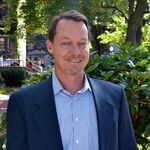By Michael Samuels
Mark Lewis has a vision. In the changing landscape of education and technology, the new director of the Geddes Language Center sees the opportunity to create a more dynamic, innovative learning experience. “It means accessing learning resources online, but it doesn’t mean divorcing the learning from the actual presence of a professor,” Lewis says, “and that’s what I love.”
For Lewis, the future of education lies in faculty and technologies working in tandem, providing the best end product for the students. That vision is more important than ever, says Gisela Hoecherl-Alden, a professor of the practice in German, CAS assistant dean and director of language instruction. With high schools now adopting online and multimedia resources in their own language courses, “incoming students expect to use technology in language classrooms and outside of the classroom,” she explains. Faculty members must adopt these technologies to meet students where they learn best.

The need for better integration of technology into the classroom is not limited to language departments, and neither is the Geddes Center, which also supports the Writing Program and beyond. Now, says Susan Jackson, senior associate dean of CAS, “Geddes is poised for further development as an exemplary campus-wide hub” for finding and integrating the current and emerging technologies that can help meet and exceed faculty members’ “visions and aspirations for curriculum and teaching.”
For the Geddes Center, that means providing and supporting the broadest possible array of resources – which thrills Lewis. “A lot of language labs have just the lab,” he said recently, standing in the center’s lounge as around him students compared notes between classes, and other students and faculty worked one-on-one at computers or went in and out of recording studios and screening rooms. Clearly, the Geddes Center is much more than just a lab—it is a meeting point for students and faculty, and under Lewis will take on a broader consultative role.
Taking Language Learning into the Digital Age
CAS offers 25 languages, from Swahili to Korean. To meet the needs of such a diverse and robust language-learning community, the Geddes Center offers resources and support for integrating technology at every level. At the center, faculty and students can create their own audio and visual materials, or draw from a library of over five thousand preexisting titles. Classes can set up at a battery of computers, where students spend an entire period working individually under an instructor’s guidance.
Support from Geddes Center staff can be as simple as helping an instructor get acquainted with Blackboard – or as complex as creating an entire online course.
As part of the President’s Digital Learning Initiative, Coordinator of African Languages Dr. Zoliswa O. Mali and Head of Korean Language Program Dr. Jaemin Roh are developing online courses for Zulu and Korean, respectively. Since BU has so many less commonly taught languages like these, the idea is to expand access beyond the university. Lewis may have just started at the end of this summer, but Mali says the director has hit the ground running with this project, already organizing a follow-up discussion for the five language instructors, including herself and Roh, who recently completed a class on developing such courses from the University of Minnesota’s CARLA Summer Institute.
To Lewis, it seemed only natural: working with faculty is the purpose of the Center. “We learn from them more than they learn from us,” he laughs.
The Geddes Center was founded in 1960, and Lewis’s predecessor, Bob Rothstein, brought it “into the twenty-first century,” says Senior Associate Dean Jackson. Rothstein installed the recording studios and screening rooms, “as well as audio, video, and computer labs,” Jackson adds, and “maintained a vigorous program of digital production,” building up the center’s library holdings. Under Rothstein, the Geddes Center also worked with CAS IT and Undergraduate Education to bring technology upgrades to Spanish classrooms. In a word, says Jackson, Rothstein was a “treasure” for CAS.
To fill his shoes, says Assistant Dean Hoecherl-Alden, CAS looked for someone with “first-hand language teaching experience coupled with extensive technological expertise.” Lewis fits the bill, having taught both language – German and Italian – and management information systems, and held previous positions steering academic technology integration at other institutions.
Now, Lewis says he’s thrilled to bring these areas together as CAS, and the university as a whole, takes this leap forward. “In a nutshell,” he says, “I want to be here to support the faculty as they evolve in their teaching.”
“That’s really the heart of what Geddes is here for,” he adds, “and hopefully will continue on for many years.”